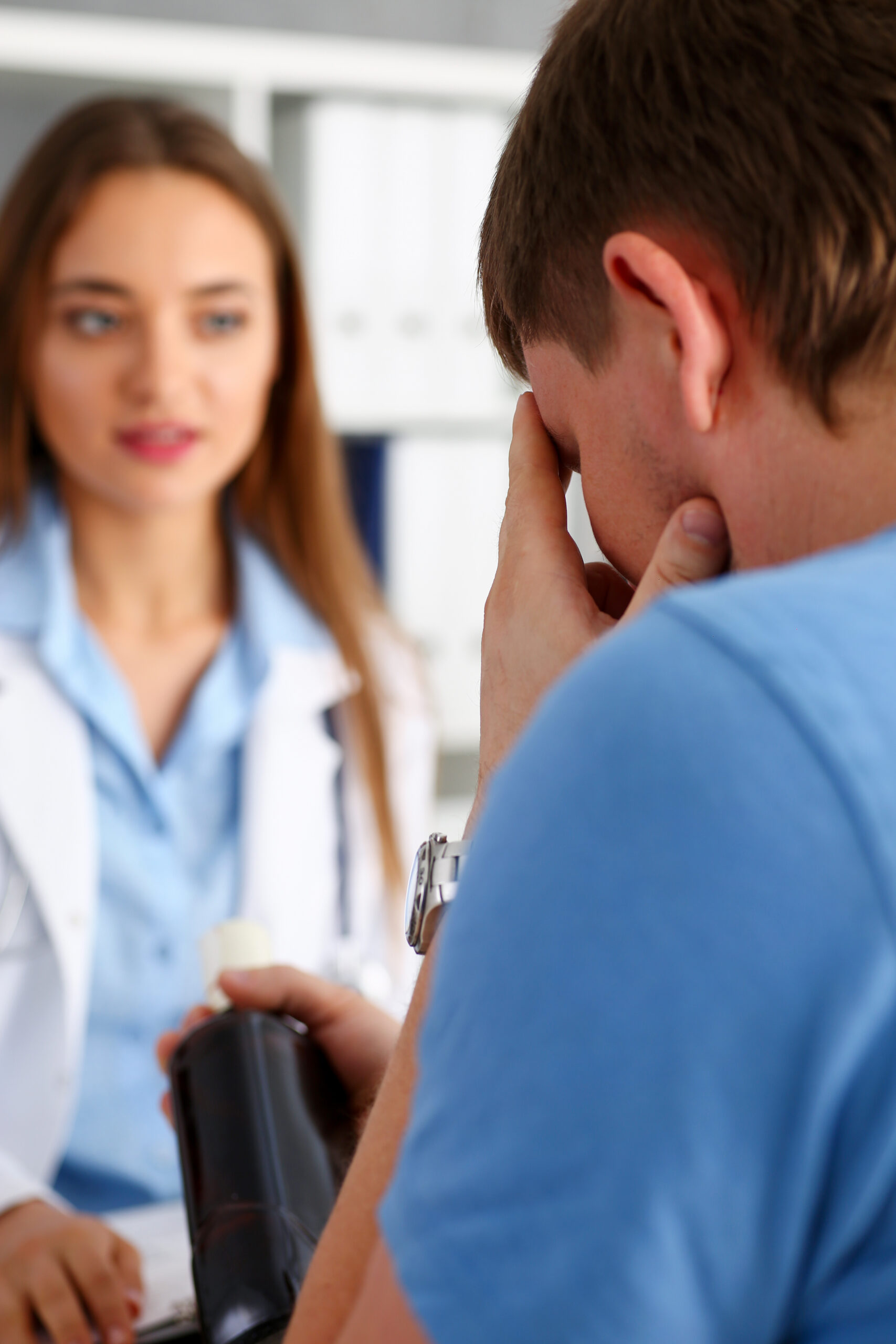Alcohol
Discover why Harbor Detox is your best choice for addiction treatment in Orange County.

lEARN mORE
Alcohol Detox in
Southern California
Detoxing from alcohol can be uncomfortable and challenging, and in severe cases, even life-threatening. A medical detox program is an important first step in recovery if you’re struggling with alcohol addiction. Harbor Detox is an alcohol detox in Southern California that can help you go through withdrawal safely to move on to the next phase of treatment.
The Effects of Alcohol Dependence
When someone is dependent on alcohol, it affects them in many negative ways, both physically and mentally. With dependence, you feel like you can’t function without alcohol. Your brain and body have become adjusted to the presence of alcohol at this point. You may also drink more than you used to to get the same effects, known as tolerance. Developing tolerance is one of the earliest signs of alcohol dependence.
Along with feeling like you need alcohol to function, other signs of a problem with drinking or an addiction can include:
- Alcohol takes priority over other things in your life.
- You keep drinking even though it has known negative effects.
- You have attempted to cut back or quit drinking and failed.
- Your relationships are being affected by drinking.
- Experiencing alcohol cravings.
Another sign of dependence is withdrawal symptoms if you reduce how much you drink or don’t drink at all.
Harbor Detox is a Southern California alcohol detox center. Along with alcohol withdrawal treatment, we provide residential inpatient addiction treatment programs.
SPEAK TO SOMEONE WHO GETS IT
Request a 100% Confidential Callback
What Happens During Alcohol Withdrawal?
Alcohol withdrawal syndrome, or AWS, is the official name for what happens if you’re alcohol-dependent and suddenly stop drinking or reduce your intake of alcohol significantly. When you have AWS, you can experience mental and physical symptoms. The most severe forms of AWS are life-threatening.
The reason for withdrawal symptoms is that excessive alcohol excites your nervous system. If you drink every day and your body is dependent on alcohol, your central nervous system has difficulty adapting to a lack of alcohol. Your brain and body are trying to get the neurotransmitter activity in your brain back to a sense of balance. Two neurotransmitters that are relevant in alcohol withdrawal include gamma-aminobutyric acid (GABA) and glutamate, which is the primary excitatory chemical in the brain.
The symptoms of alcohol withdrawal syndrome can include:
- Tremors
- Irregular heart rate
- Fever
- Dehydration
- Agitation
- Anxiety
- Hearing disturbances
- Cloudy thinking
- Headache
- Nausea and vomiting
- Sweating
- Visual disturbances
- Depression
- Loss of appetite
- Insomnia
- Restlessness
- Irritability
The signs of alcohol withdrawal can be mild to severe. Harbor Detox is an alcohol detox in Southern California, offering the highest level of care and treatment.
Stories of Recovery
Experience, Strength & Hope

Options in Treatment
What Are Delirium Tremens?
Delirium tremens is the most severe type of alcohol withdrawal, usually experienced in long-term heavy alcohol users. It’s rare but life-threatening. Around half of people who misuse alcohol experience symptoms of withdrawal, but only around 5% at most will experience symptoms related to delirium tremens.
Delirium tremens symptoms include:
- Extreme agitation or irritability
- Confusion
- Impairments in consciousness
- Hallucinations (auditory, visual, or tactile)
- Tremors or seizures
- Autonomic hyperactivity, including sweating, rapid heart rate, nausea, and vomiting
Risk factors for a more severe withdrawal experience include:
- You consumed a lot of alcohol in the weeks leading up to withdrawal.
- You’ve gone through alcohol withdrawal in the past and had severe symptoms.
- Underlying health issues exist, like liver or heart disease.
- Being older.
- Taking other medicines.
- Having a mental health disorder.
- Poor overall health.
Delirium tremens don’t last forever but can be deadly without proper medical treatment. Getting medical attention before withdrawal can help you avoid severe symptoms and delirium tremens during withdrawal. Harbor Detox is an alcohol detox in Southern California that can help you through this process.
WHAT WE DO
Comprehensive Treatment
Harbor Detox in Orange County, California offers a variety of drug & alcohol addiction treatment options.
The Timeline of Alcohol Withdrawal
There’s not one specific timeline of alcohol withdrawal that applies to everyone. Individual factors affect the symptoms you experience, how severe they are, and how long they last. These factors include:
- Gender, age, and weight
- How long you’ve been using alcohol.
- The severity of your use.
- Your mental and physical health.
- If you combine alcohol with other substances.
While it can vary, the general timeline might look something like the following:
- Symptoms might begin appearing between four and 12 hours after the last drink.
- Peak symptoms of alcohol withdrawal are usually in the first 24 to 72 hours.
- If a person experiences delirium tremens, the symptoms usually begin 48 to 72 hours after the last drink, continuing for a few days.
- By day four or five, most symptoms should be gone.
You’ll also sometimes see withdrawal symptoms described in phases or stages.
- Stage One (Mild): These symptoms can include hand tremors, heart palpitations, insomnia, anxiety, or headache.
- Stage Two (Moderate): Symptoms in this stage could include everything from stage one, high blood pressure, increased heart rate, or rapid breathing.
- Stage Three (Severe): Symptoms in stage three are in addition to what happens in stage 2 and include hallucinations, seizures, and disorientation.
At Harbor Detox, a leading alcohol detox in Southern California, we help clients work through their withdrawal symptoms in a safe, comfortable, and medically-monitored environment.
The Benefits of a Medical Detox
When you have an alcohol use disorder, a medical detox can be an important first step in recovery. You have to detox from alcohol before you can begin treatment fully. Once alcohol and other substances clear from your system, you can start dealing with the underlying contributors to your addiction.
Since alcohol withdrawal can be stressful and uncomfortable, medical professionals monitor you during a medical detox. They can ensure your symptoms remain in control and provide medications as needed.
The Food and Drug Administration currently approves three medicines to help treat alcohol withdrawal and alcohol use disorder.
- Disulfiram blocks an enzyme that metabolizes alcohol. With this medicine, if someone consumes even a tiny bit of alcohol, they’ll experience negative symptoms.
- Naltrexone is available as the brand name products Revia and Vivitrol. Naltrexone was originally intended to treat opioid use disorder but is now used to help treat alcohol withdrawal. Naltrexone is thought to reduce cravings for alcohol.
- Acamprosate or Campral is used to restore a sense of balance to the nervous system. It doesn’t prevent withdrawal symptoms, but it can help.
Harbor Detox Offers Alcohol Detox Treatment in Southern California
Along with medicines specifically for alcohol withdrawal, other treatments can be used as needed. For example, anti-seizure medicines could be part of your treatment plan.
Making it safely and relatively comfortable through a detox program is critical to begin your recovery.
Harbor Detox, an alcohol detox in Southern California, helps people as they move through withdrawal. Our medical team is dedicated to creating tailored treatments to help you during this time.
If you’d like to learn more about alcohol detox in Southern California or want to take the next step, we’re available to help or answer questions.







